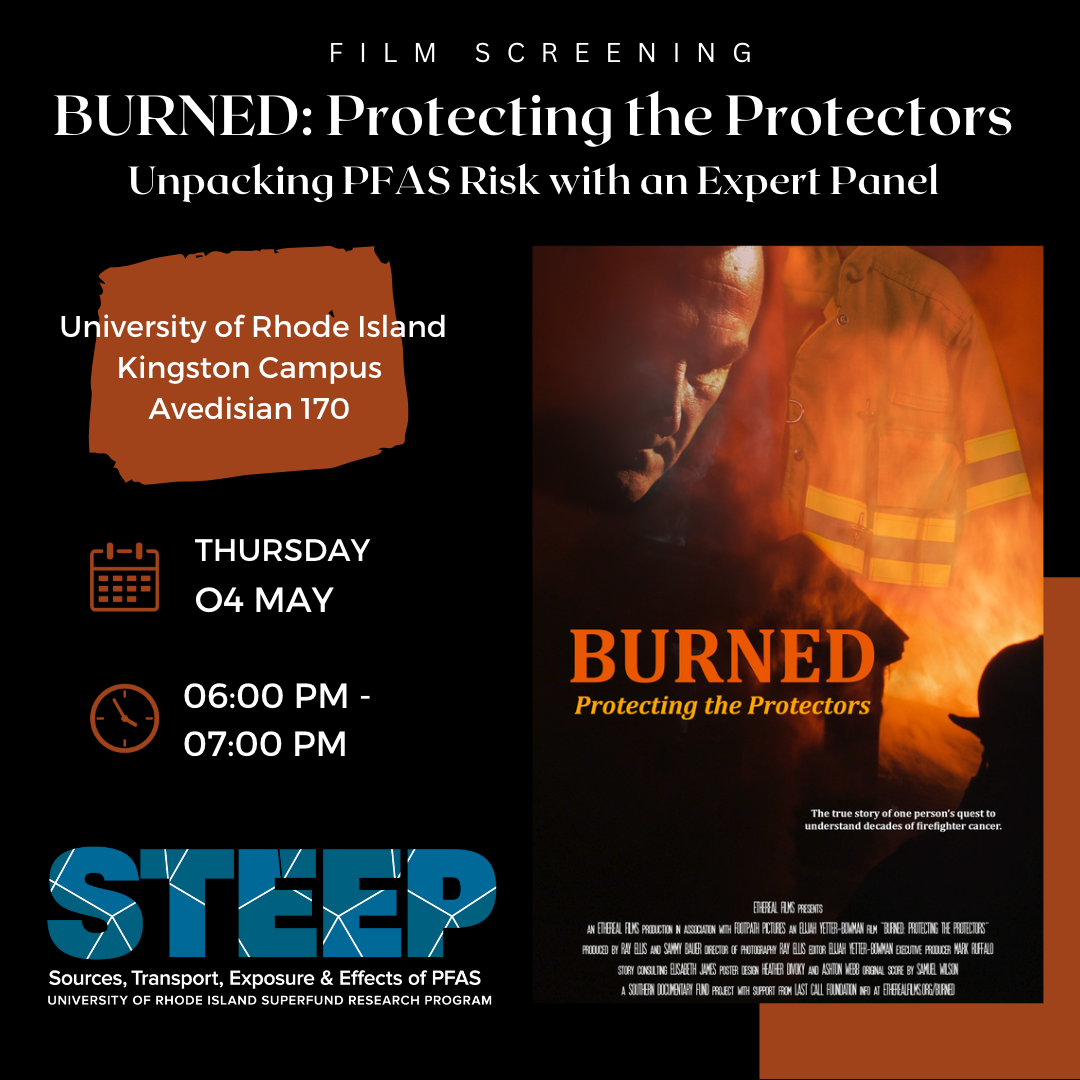URI to host film screening and discussion on impact of PFAS in firefighting
The University of Rhode Island is providing a forum for a true story that illustrates the impact of PFAS in a personal way, with the film screening of Burned, the story of how the spouse of a firefighter revealed significant exposure to forever chemicals affecting the firefighting community nationally.
The film drives home the prevalence of PFAS because it
tells the story of a local community – Fall River – and an unexpected source of
exposure to the chemicals in firefighter turnout gear with high levels of PFAS
not disclosed on labels.
The 30-minute film will be hosted by URI’s Superfund
Research Program, STEEP (Sources, Transport, Exposure and Effects of
PFAS) on Thursday, May 4, from 6 to 7 p.m. in Room 170 of the College of
Pharmacy’s Avedisian Hall, 7 Greenhouse Road, Kingston.
The URI community and the public are invited to attend
the screening and panel discussion featuring Jason Burns, Fall River
firefighter and executive director of the Last Call Foundation, with Rainer
Lohmann, Ph.D., director of STEEP at URI’s Graduate School of
Oceanography, and Angela Slitt, Ph.D., STEEP researcher and project lead,
from the URI College of Pharmacy.
They have been joined in their efforts to share information about PFAS, or “forever chemicals,” by STEEP stakeholder and advocate Diane Cotter, who has worked for many years to expose the existence of these harmful chemicals in firefighter turnout gear.
Cotter is the wife of the
firefighter featured in the film and has participated in STEEP public lectures
and events. She first became alert to the existence — and impact — of PFAS
after her husband’s cancer diagnosis and witnessing the rate of illness of
young firefighters in the department.
The documentary premiered earlier this year and is a
collaboration between Ethereal Films, the Last Call Foundation, and Footpath
Pictures. It was produced by actor Mark Ruffalo.
URI STEEP Superfund Research Center, employs research, applied science, student education and training, and outreach approaches to build community capacity for responding to PFAS pollution.
PFAS, a large and decades-old family of chemicals, infiltrate many human and natural environments, such as the chemicals that coat pizza boxes and microwave popcorn bags, nonstick cookware, and waterproof clothing. These heavily used chemicals have also leached into water, from marine habitats to drinking water resources.
URI’s STEEP is committed to ensuring that sound science informs public dialogue
on the issue and is funded by the National Institute of Environmental Health
Sciences through a multi-project center grant awarded by the National Institute
of Environmental Health Sciences’ Superfund Research Program.
Lohmann, a chemical oceanographer and STEEP lead
researcher, says, “We know that the aqueous foam used in firefighting gear can
sicken people who work with it, and also contaminate groundwater where the foam
is used often, like airports or fire training sites. Now we’re learning that
firefighters are likely up against another PFAS challenge — the turnout gear
that’s actually supposed to protect them.”
STEEP team members say that awareness is critical to
avert human and environmental health impacts from PFAS exposure.
“PFAS have been proven to be tied to broad and serious
health issues, from increased cancer risk to hypothyroidism to dyslipidemia to
decreased response to vaccination,” says toxicologist and STEEP co-lead
researcher Slitt of the University’s College of Pharmacy. “If we can identify
and understand PFAS risk from occupational exposure, we can determine whether
their chemical exposure has also impacted their health and risk for disease.”
Visit here to register for the film. The presentation is
free and open to the public and firehouses are particularly encouraged to
attend.
To learn more about URI’s STEEP Project or the screening
of Burned, please visit https://web.uri.edu/steep/ or
contact Jaclyn Witterschein, jwitterschein@uri.edu, 401-874-6886.
